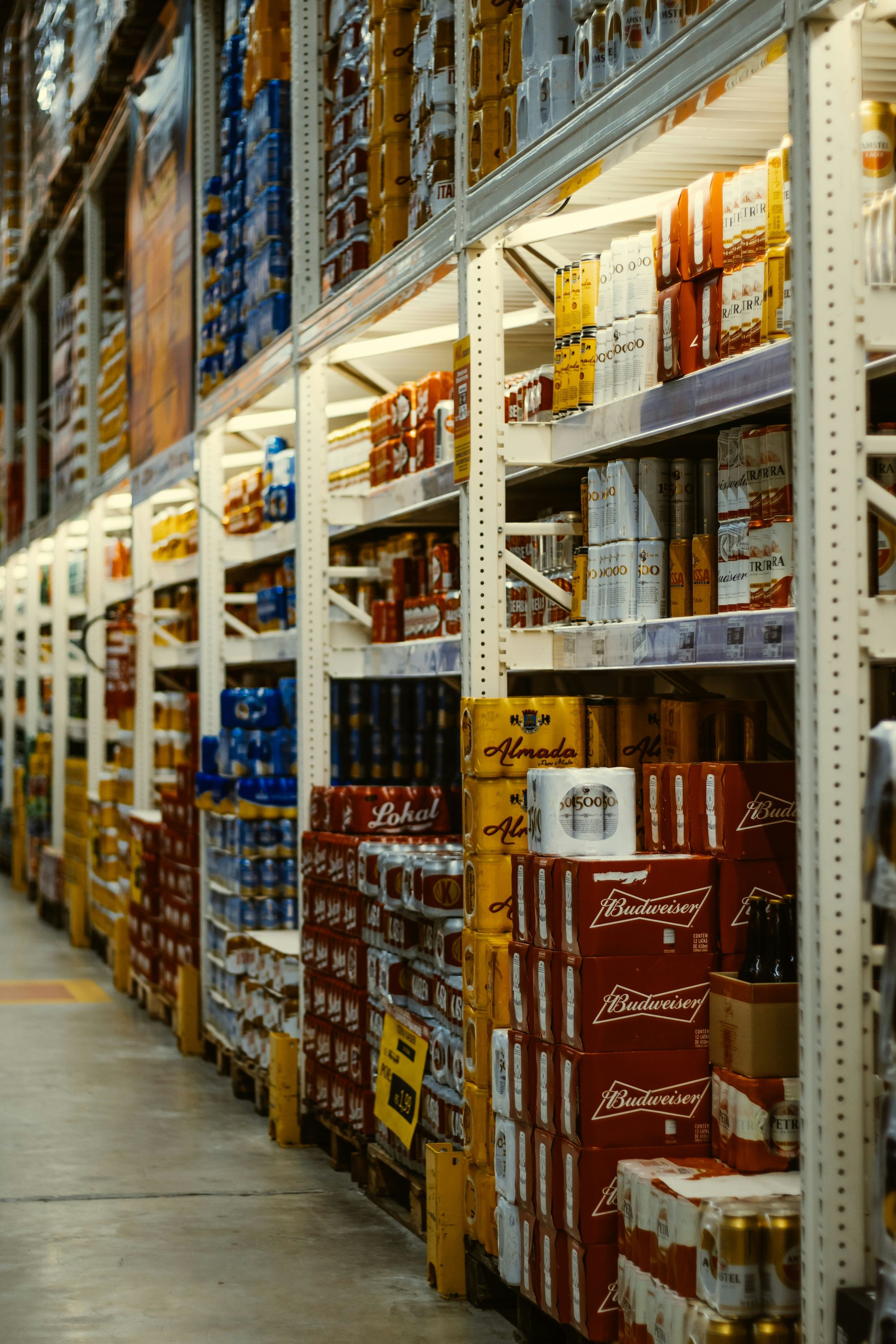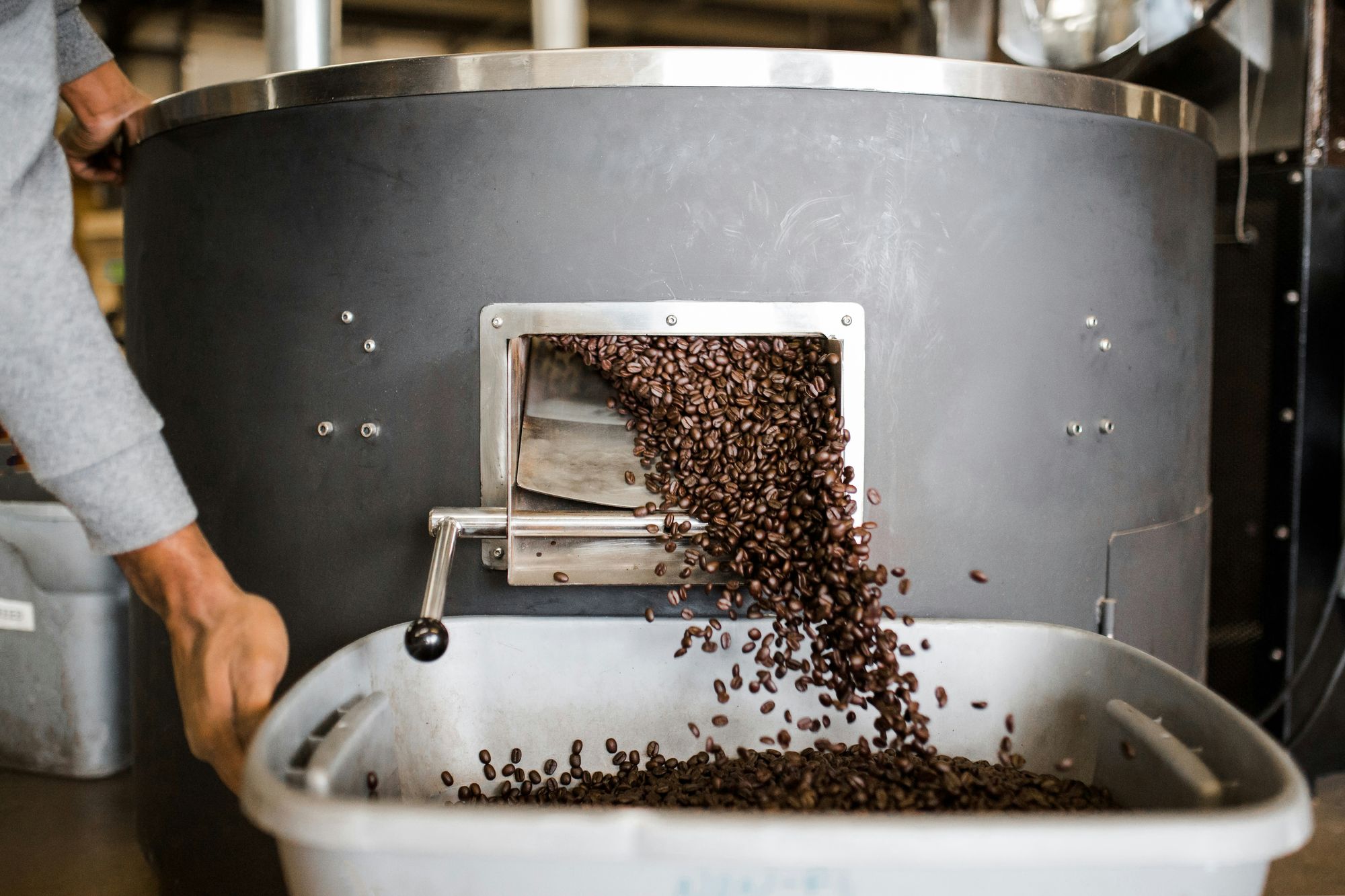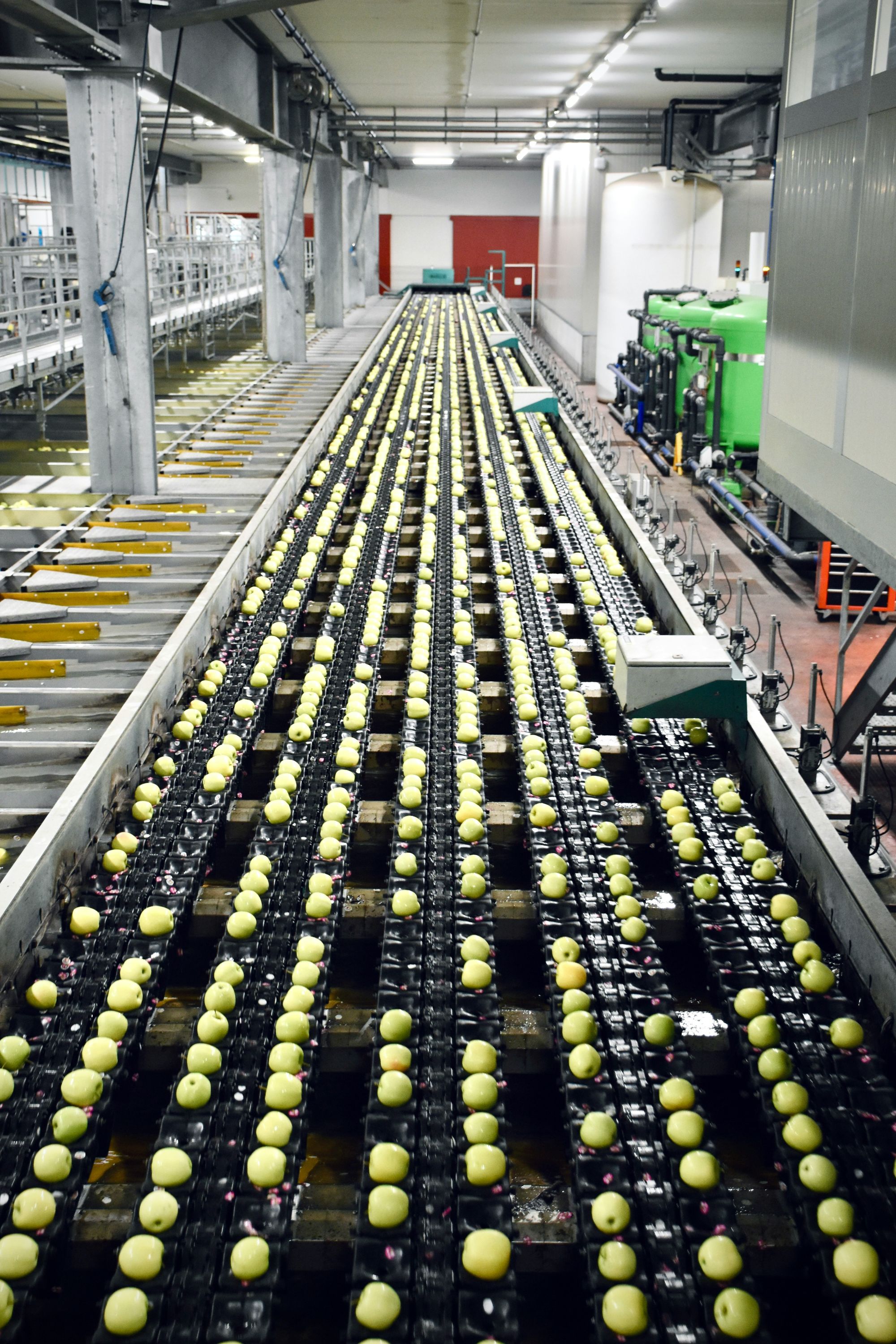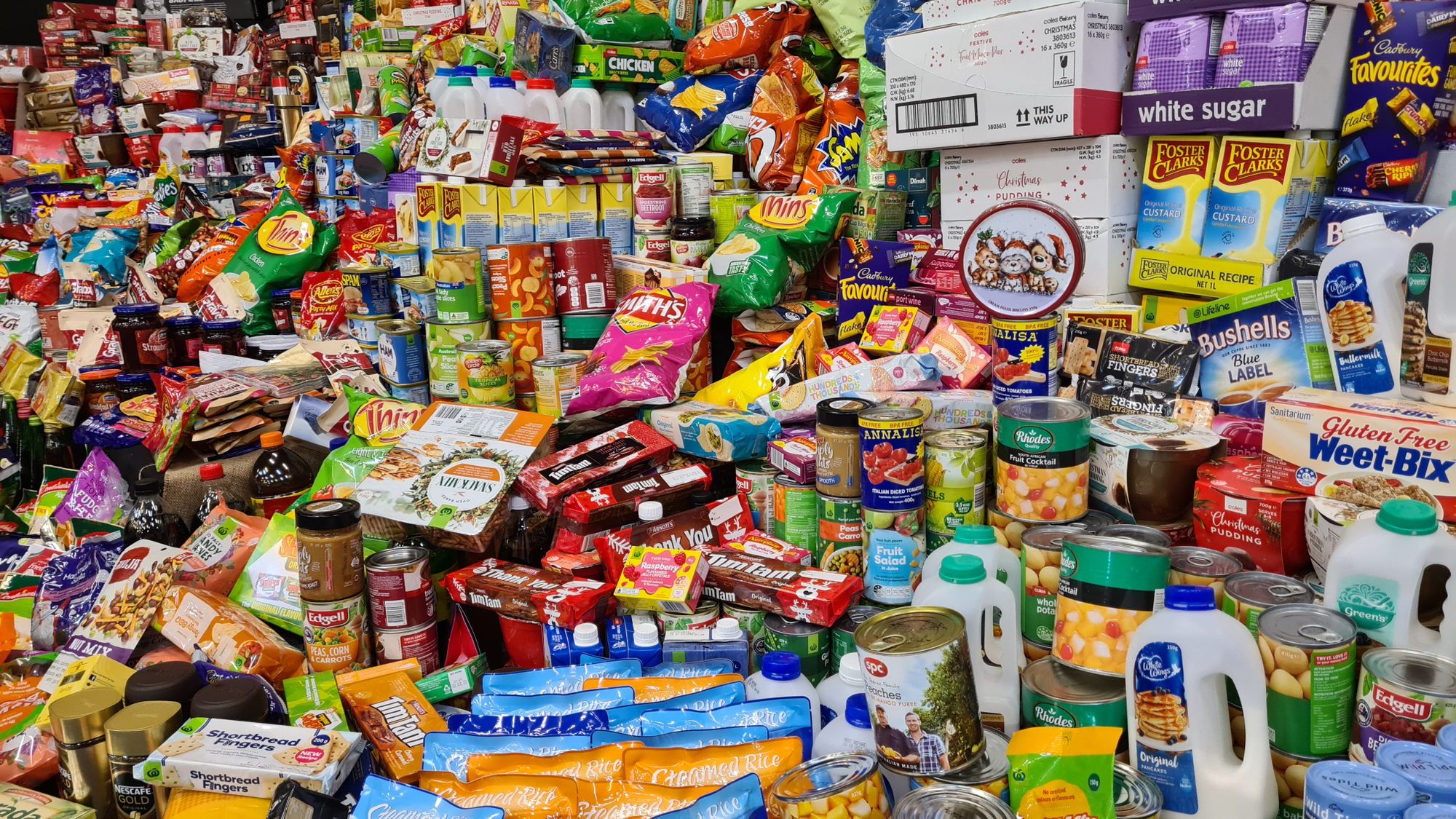Do you want to understand how food and beverage ERP will help you with real-time analytics, hence elevating your business’ performance? If your answer to this question is right, then you are on the right page.
In the fast-paced and highly competitive landscape of the food and beverage industry, staying ahead requires more than just quality products. It demands precision, adaptability, and swift decision-making.
This is where real-time analytics integrated into food and beverage ERP systems shine as indispensable tools for success. By harnessing the power of real-time data insights, these systems revolutionize how businesses operate, empowering them to elevate their performance to new heights.

In this discussion, we delve into the transformative impact of real-time analytics in food and beverage ERP systems, exploring how they optimize processes, enhance decision-making, and ultimately drive business success.
From streamlining production to ensuring compliance, real-time analytics paves the way for operational excellence, efficiency, and innovation in the dynamic realm of food and beverage manufacturing.
The topics covered in this article are:
- What is the Food and Beverage Industry?
- What is Real-Time Analytics?
- Challenges Faced by the Food and Beverage Industry
- Benefits of Real-time Analytics in the Food and Beverage Industry
- What is Food and Beverage ERP?
- How Real-Time Analytics in Food and Beverage ERP Elevates Business Performance
- How can Deskera Help with Real-Time Analytics as a Food and Beverage ERP?
- Key Takeaways
- Related Articles
What is the Food and Beverage Industry?
The food and beverage industry encompasses a wide range of businesses involved in the production, processing, distribution, and sale of food and drink products for human consumption.
It is a multifaceted industry that includes various sectors such as agriculture, manufacturing, retail, and hospitality. The food and beverage industry plays a crucial role in providing essential goods to consumers worldwide and contributes significantly to the global economy.
Key components of the food and beverage industry include:
- Agriculture and Farming: This sector involves the cultivation of crops, raising livestock, and harvesting raw materials such as fruits, vegetables, grains, and meat used in food production.
- Food Processing and Food Manufacturing: Food processing companies transform raw agricultural products into processed foods through various techniques such as milling, grinding, canning, freezing, and packaging. This sector includes a wide range of products, including snacks, beverages, dairy products, baked goods, and canned foods.
- Beverage Production: Beverage companies produce a diverse range of drinks, including alcoholic beverages (such as beer, wine, and spirits) and non-alcoholic beverages (such as soft drinks, juices, bottled water, and energy drinks).
- Distribution and Logistics: Distribution and logistics companies play a vital role in transporting food and beverage products from manufacturers to retailers, wholesalers, and consumers. This includes storage, warehousing, transportation, and supply chain management.
- Retail and Foodservice: Retailers, including supermarkets, grocery stores, convenience stores, and specialty food shops, sell food and beverage products directly to consumers. Foodservice establishments, such as restaurants, cafes, bars, and catering services, serve prepared meals and beverages to customers.
- Hospitality and Tourism: The hospitality industry, including hotels, resorts, cruise lines, and entertainment venues, provides food and beverage services to guests and visitors as part of their overall hospitality experience.
Overall, the food and beverage industry is diverse and dynamic, with companies ranging from small-scale local producers to multinational corporations. It plays a vital role in meeting the nutritional needs of populations worldwide while also contributing to economic growth, employment, and cultural diversity.
What is Real-Time Analytics?
Real-time analytics refers to the process of analyzing data and generating insights in real-time or near real-time, as data is being generated or collected. Unlike traditional analytics, which may involve batch processing and delayed reporting, real-time analytics provides instantaneous insights that enable immediate action and decision-making.
Real-time analytics involves the use of advanced technologies and algorithms to process and analyze data streams as they are generated, often in milliseconds or seconds. This allows businesses to monitor operations, detect anomalies, identify trends, and respond promptly to changing conditions or events.
Real-time analytics is commonly used in various industries and applications, including finance, healthcare, manufacturing, retail, and telecommunications. In the context of the food and beverage industry, real-time analytics can provide insights into sales trends, inventory levels, production processes, supply chain operations, and customer behavior, enabling manufacturers to optimize operations, improve efficiency, and enhance business performance.
Challenges Faced by the Food and Beverage Industry
The food and beverage industry faces several challenges that can be effectively addressed with the implementation of real-time analytics. Some of these challenges include:
- Supply Chain Complexity: The food and beverage supply chain is often complex, involving multiple stakeholders, perishable goods, and stringent regulatory requirements. Real-time analytics can provide end-to-end visibility into the supply chain, enabling businesses to track inventory levels, monitor supplier performance, and identify potential bottlenecks or disruptions in real time.
- Inventory Management: Managing inventory levels is crucial in the food and beverage industry to ensure freshness, minimize waste, and meet customer demand. Real-time analytics can help businesses optimize inventory management by providing insights into inventory levels, consumption patterns, and shelf life, allowing for better stock rotation and reduced carrying costs.
- Quality Control and Compliance: Ensuring product quality and compliance with regulatory standards is a top priority for food and beverage companies. Real-time analytics can facilitate proactive quality control by monitoring production processes, detecting deviations from quality standards, and triggering alerts for immediate corrective actions. This helps businesses maintain product integrity and compliance with regulatory requirements.
- Demand Forecasting: Accurate demand forecasting is essential for optimizing production schedules, inventory levels, and resource allocation. Real-time analytics enable businesses to analyze sales data, market trends, and customer behavior in real time, allowing for more accurate demand forecasting and better alignment of production with customer demand.
- Customer Expectations: Meeting customer expectations for freshness, quality, and variety is critical in the food and beverage industry. Real-time analytics can help businesses understand customer preferences, purchasing patterns, and feedback in real time, allowing for personalized marketing efforts, product offerings, and customer service initiatives to enhance customer satisfaction and loyalty.
- Operational Efficiency: Improving operational efficiency is a continuous challenge for food and beverage companies striving to reduce costs and increase productivity. Real-time analytics can identify inefficiencies, optimize production processes, and automate routine tasks in real time, leading to improved operational efficiency and profitability.
- Market Competition: The food and beverage industry is highly competitive, with constantly evolving consumer preferences and emerging competitors. Real-time analytics can provide businesses with a competitive edge by enabling quick responses to market trends, agile decision-making, and innovation in product development and marketing strategies.
Overall, real-time analytics offer food and beverage companies the opportunity to overcome these challenges, improve agility, and drive growth and innovation in a dynamic and highly competitive market landscape.
Benefits of Real-time Analytics in the Food and Beverage Industry
Real-time analytics offer numerous benefits to the food and beverage industry, helping companies streamline operations, improve efficiency, and enhance decision-making. Some of the key benefits include:
- Improved Operational Efficiency: Real-time analytics enable companies to monitor operations continuously, identify bottlenecks, and optimize processes in real time. This leads to improved resource utilization, reduced waste, and increased productivity across the supply chain.
- Enhanced Inventory Management: By providing real-time visibility into inventory levels, real-time analytics help companies optimize inventory management, reduce stockouts, minimize excess inventory, and improve overall inventory turnover rates.
- Better Demand Forecasting: Real-time analytics enable more accurate demand forecasting by analyzing sales data, market trends, and customer behavior in real time. This allows companies to align production schedules with anticipated demand, optimize inventory levels, and reduce the risk of overstocking or stockouts.
- Faster Response to Market Trends: Real-time analytics enable companies to respond quickly to changes in consumer preferences, market trends, and competitive dynamics. This agility allows companies to adjust production schedules, pricing strategies, and marketing campaigns in real time to capitalize on opportunities and mitigate risks.
- Enhanced Quality Control: Real-time analytics facilitate proactive quality control by continuously monitoring production processes, equipment performance, and product quality in real time. This helps companies detect and address quality issues early, ensuring compliance with regulatory standards and maintaining product quality and safety.
- Optimized Supply Chain Management: Real-time analytics provide end-to-end visibility into the supply chain, enabling companies to track shipments, monitor supplier performance, and identify potential risks or disruptions in real time. This helps companies optimize sourcing, reduce lead times, and improve overall supply chain efficiency.
- Personalized Customer Experiences: Real-time analytics enable companies to analyze customer data and personalize marketing messages, promotions, and product recommendations in real time. This leads to enhanced customer satisfaction, loyalty, and retention.
- Data-Driven Decision-Making: Real-time analytics empower companies to make informed, data-driven decisions based on real-time insights and analysis. This helps companies identify trends, patterns, and opportunities, enabling more effective strategic planning and execution.
Overall, real-time analytics offer significant advantages to the food and beverage industry, helping companies stay competitive, adapt to changing market conditions, and drive growth and innovation.
What is Food and Beverage ERP?
A food and beverage ERP (Enterprise Resource Planning) system is a specialized software solution designed to meet the unique needs and challenges of companies operating in the food and beverage industry.
It integrates and automates various business processes, including production, inventory management, supply chain operations, quality control, and compliance, into a single comprehensive platform.
Here are some key features and functionalities of a Food and Beverage ERP system:
- Recipe and Formula Management: Allows manufacturers to manage recipes and formulas for food and beverage products, including ingredient lists, quantities, and instructions.
- Production Planning and Scheduling: Enables manufacturers to plan and schedule production activities based on demand forecasts, resource availability, and production capacities.
- Inventory Management: Helps in tracking and managing inventory levels, including raw materials, ingredients, work-in-progress, and finished goods, to ensure optimal stock levels and minimize wastage.
- Quality Control and Compliance: Provides tools for monitoring and enforcing quality control measures, ensuring compliance with regulatory standards and industry certifications, and managing traceability and recall processes.
- Supply Chain Management: Facilitates end-to-end supply chain visibility, including procurement, supplier management, logistics, and distribution, to optimize sourcing, reduce lead times, and enhance collaboration with suppliers and distributors.
- Financial Management: Includes modules for managing financial transactions, budgeting, costing, and reporting, providing insights into profitability, cost efficiency, and financial performance.
- Customer Relationship Management (CRM): Helps in managing customer relationships, including order processing, pricing, promotions, and customer service, to enhance customer satisfaction and loyalty.
- Real-time Analytics and Reporting: Provides real-time insights into key performance indicators (KPIs), operational metrics, and business analytics, enabling data-driven decision-making and continuous performance improvement.
- Mobility and Integration: Supports mobility features and integration with other systems, such as manufacturing software and third-party applications, to streamline operations and enhance productivity.
Overall, a food and beverage ERP system helps companies in the food and beverage industry streamline operations, improve efficiency, ensure compliance, and maintain a competitive edge in a dynamic and highly regulated market.
How Real-Time Analytics in Food and Beverage ERP Elevates Business Performance
Real-time analytics in food and beverage ERP systems can significantly elevate business performance in several ways:
Demand Forecasting
Real-time analytics integrated into food and beverage ERP systems play a pivotal role in enhancing business performance. Specifically, in demand forecasting, these capabilities enable manufacturers to anticipate market needs accurately, optimize inventory management, and streamline production processes.
- Accurate Market Insights: Leveraging real-time analytics within food and beverage ERP, manufacturers gain instant access to market trends, customer preferences, and sales data. This enables them to make informed decisions regarding production volumes and product offerings.
- Optimized Inventory Management: With real-time visibility into demand fluctuations and inventory levels, food and beverage manufacturers can optimize stock levels effectively. This ensures that they maintain adequate inventory to meet customer demand while minimizing excess stock and associated costs.
- Streamlined Production Planning: Real-time analytics empower manufacturers to align production schedules with anticipated demand. By integrating demand forecasts with manufacturing software, businesses can optimize resource allocation, minimize idle capacity, and enhance overall production efficiency.
- Responsive Supply Chain Management: Food and beverage ERP systems equipped with real-time analytics enable proactive supply chain management. Manufacturers can anticipate changes in demand, adjust procurement strategies accordingly, and foster closer collaboration with suppliers to ensure timely deliveries.
- Enhanced Productivity: By leveraging manufacturing ERP solutions with real-time analytics capabilities, food and beverage companies can improve productivity across the entire production process. This includes reducing setup times, optimizing batch sizes, and enhancing equipment utilization based on demand forecasts.
- Cost Reduction: Accurate demand forecasting facilitated by real-time analytics helps food and beverage manufacturers minimize costs associated with excess inventory, stockouts, and rush orders. This leads to improved cost efficiency and better utilization of financial resources.
In conclusion, real-time analytics integrated into MRP software systems elevate business performance by enabling accurate demand forecasting. By leveraging these capabilities, manufacturers can optimize inventory management, streamline production processes, and enhance overall operational efficiency in the dynamic food and beverage industry.
Inventory Management
Effective inventory management is critical for food and beverage manufacturers to ensure product availability, minimize waste, and optimize costs. Real-time analytics integrated into food and beverage ERP systems play a crucial role in elevating business performance by providing insights into inventory levels, turnover rates, and demand patterns.
- Dynamic Inventory Optimization: Food and beverage ERP systems equipped with real-time analytics allow manufacturers to dynamically optimize inventory levels based on demand fluctuations, seasonal trends, and production schedules. This ensures that businesses maintain optimal stock levels to meet customer demand while minimizing carrying costs.
- Shelf-Life Management: Real-time analytics enable precise monitoring of inventory with expiration dates, especially crucial in the food and beverage industry where product freshness is paramount. By integrating shelf-life data into manufacturing ERP solutions, businesses can minimize waste by proactively managing stock rotation and reducing the risk of expired products.
- Demand-Driven Replenishment: Leveraging real-time analytics, food and beverage manufacturers can implement demand-driven replenishment strategies. By analyzing sales data, production forecasts, and lead times, businesses can automate replenishment orders through MRP software, ensuring timely procurement of raw materials and components to maintain optimal inventory levels.
- Batch and Lot Tracking: Real-time analytics capabilities in food and beverage ERP systems enable batch tracking and lot tracking throughout the supply chain. Manufacturers can trace the movement of raw materials, ingredients, and finished products in real time, enhancing visibility and compliance with regulatory requirements such as traceability and recall management.
- Cost-Efficient Procurement: By integrating real-time analytics into procurement processes, food and beverage companies can optimize sourcing strategies and negotiate better terms with suppliers. Manufacturing software solutions equipped with analytics capabilities provide insights into supplier performance, pricing trends, and market dynamics, facilitating data-driven decision-making in procurement.
- Just-in-Time Inventory Management: Real-time analytics empower food and beverage manufacturers to adopt just-in-time (JIT) inventory management practices. By synchronizing production with demand, businesses can minimize inventory holding costs, reduce the risk of obsolescence, and improve cash flow efficiency.
In summary, real-time analytics integrated into food and beverage ERP systems elevate business performance by enabling dynamic inventory optimization, shelf-life management, demand-driven replenishment, batch tracking, cost-efficient procurement, and JIT inventory management.
By leveraging these capabilities, manufacturers can enhance operational efficiency, minimize waste, and stay competitive in the fast-paced food and beverage industry.
Production Planning and Optimization
Efficient production planning and optimization are essential for food and beverage manufacturers to meet customer demand, minimize waste, and maximize profitability.
Real-time analytics integrated into food and beverage ERP systems play a pivotal role in elevating business performance by providing insights into production schedules, resource utilization, and market dynamics.
- Dynamic Production Scheduling: Food and beverage ERP systems equipped with real-time analytics enable manufacturers to dynamically adjust production schedules based on demand forecasts, inventory levels, and resource availability. This agility ensures that businesses can respond quickly to changing market conditions and customer preferences.
- Resource Allocation Optimization: Real-time analytics empower food and beverage manufacturers to optimize resource allocation across production processes. By analyzing data on equipment utilization, labor productivity, and material consumption, businesses can identify inefficiencies and implement strategies to improve overall production efficiency.
- Batch Size Optimization: Leveraging real-time analytics, manufacturers can optimize batch sizes to minimize setup times, reduce waste, and maximize throughput. Manufacturing ERP solutions equipped with analytics capabilities enables businesses to identify the most cost-effective batch sizes based on demand variability and production constraints.
- Production Yield Improvement: Real-time analytics facilitate continuous monitoring of production processes to identify opportunities for yield improvement. By analyzing data on raw material usage, process parameters, and quality metrics, food and beverage manufacturers can implement corrective actions to enhance product quality and reduce waste.
- Equipment Maintenance Planning: MRP software systems with real-time analytics capabilities enable predictive maintenance planning for production equipment. By monitoring equipment performance data in real-time, manufacturers can identify potential issues before they lead to downtime, optimize maintenance schedules, and extend equipment lifespan.
- Continuous Improvement Initiatives: Real-time analytics provide valuable insights for driving continuous improvement initiatives in production processes. By analyzing performance metrics such as OEE (Overall Equipment Effectiveness) and cycle times, businesses can identify areas for optimization, implement process improvements, and enhance overall operational efficiency.
In conclusion, real-time analytics integrated into manufacturing software systems elevate business performance by enabling dynamic production scheduling, resource allocation optimization, batch size optimization, production yield improvement, equipment maintenance planning, and continuous improvement initiatives.
By leveraging these capabilities, manufacturers can enhance productivity, reduce costs, and maintain a competitive edge in the dynamic food and beverage industry.
Quality Control
Maintaining high-quality standards is paramount for food and beverage manufacturers to ensure consumer safety, regulatory compliance, and brand reputation.
Real-time analytics integrated into food and beverage ERP systems play a crucial role in elevating business performance by providing insights into quality control processes, facilitating proactive monitoring, and enabling timely corrective actions.
- Real-time Monitoring of Critical Parameters: Food and beverage ERP systems equipped with real-time analytics enable continuous monitoring of critical parameters such as temperature, humidity, pH levels, and microbial counts during production and storage. This real-time monitoring helps in detecting deviations from predefined thresholds, ensuring product safety and quality.
- Immediate Alerts and Notifications: Real-time analytics trigger immediate alerts and notifications when quality control parameters exceed acceptable limits. This enables quick response by production personnel to address issues before they escalate, minimizing the risk of product defects or recalls.
- Root Cause Analysis: Leveraging real-time analytics, food and beverage manufacturers can conduct root cause analysis to identify factors contributing to quality issues. By analyzing production data, process variables, and quality metrics, businesses can pinpoint underlying causes and implement corrective actions to prevent recurrence.
- Process Optimization for Consistent Quality: Real-time analytics provide insights into production processes, enabling optimization for consistent product quality. By analyzing data on process parameters, equipment performance, and raw material variations, manufacturers can identify opportunities to standardize processes and improve product consistency.
- Compliance with Regulatory Standards: Manufacturing ERP systems with real-time analytics capabilities facilitates compliance with stringent regulatory standards and quality certifications. By monitoring quality control processes in real time and maintaining comprehensive documentation, businesses can demonstrate adherence to regulatory requirements and ensure consumer safety.
- Supplier Quality Management: Real-time analytics enable proactive management of supplier quality by monitoring incoming raw materials and ingredients. By analyzing supplier performance data and quality metrics, food and beverage manufacturers can assess supplier reliability, identify potential risks, and collaborate with suppliers to maintain consistent product quality.
In summary, real-time analytics integrated into manufacturing software systems elevate business performance by enhancing quality control processes, enabling proactive monitoring, facilitating root cause analysis, optimizing production processes for consistent quality, ensuring compliance with regulatory standards, and managing supplier quality effectively.
By leveraging these capabilities, manufacturers can safeguard brand reputation, ensure consumer trust, and drive sustainable growth in the competitive food and beverage industry.
Supply Chain Visibility
Effective supply chain management is crucial for food and beverage manufacturers to ensure timely delivery of products, optimize costs, and mitigate risks.
Real-time analytics integrated into food and beverage ERP systems play a pivotal role in elevating business performance by providing visibility into the entire supply chain, facilitating proactive decision-making, and enhancing collaboration with suppliers and distributors.
- End-to-End Supply Chain Visibility: Food and beverage ERP systems equipped with real-time analytics offer comprehensive visibility into the entire supply chain, from raw material sourcing to distribution. This visibility enables manufacturers to track inventory levels, monitor production progress, and anticipate potential bottlenecks or disruptions.
- Real-time Inventory Tracking: Real-time analytics enable continuous tracking of inventory levels throughout the supply chain. By integrating data from manufacturing software, food and beverage manufacturers can monitor inventory movement in real time, identify inventory imbalances, and optimize stock levels to meet demand.
- Demand Forecasting and Planning: Leveraging real-time analytics, manufacturers can enhance demand forecasting accuracy and align production schedules with anticipated demand. By analyzing sales data, market trends, and customer behavior, businesses can optimize inventory levels, minimize stockouts, and improve customer service levels.
- Supplier Collaboration and Performance Management: Real-time analytics facilitate closer collaboration with suppliers by providing insights into supplier performance, lead times, and delivery reliability. Manufacturing ERP systems equipped with analytics capabilities enable manufacturers to identify high-performing suppliers, negotiate better terms, and mitigate risks associated with supplier disruptions.
- Risk Management and Mitigation: Real-time analytics help food and beverage manufacturers identify and mitigate risks across the supply chain. By monitoring key performance indicators (KPIs) such as supplier lead times, transportation delays, and inventory levels, businesses can proactively address potential issues and ensure continuity of operations.
- Compliance and Regulatory Reporting: Food and beverage ERP systems with real-time analytics capabilities facilitate compliance with regulatory requirements and industry standards. By monitoring quality control processes, traceability, and labeling regulations in real time, manufacturers can ensure adherence to standards and minimize the risk of non-compliance penalties.
In conclusion, real-time analytics integrated into MRP software systems elevate business performance by providing end-to-end supply chain visibility, enabling real-time inventory tracking, enhancing demand forecasting and planning, facilitating supplier collaboration and performance management, mitigating risks, and ensuring compliance with regulatory requirements.
By leveraging these capabilities, manufacturers can optimize supply chain operations, improve efficiency, and maintain a competitive edge in the dynamic food and beverage industry.
Price Optimization
Price optimization is critical for food and beverage manufacturers to remain competitive, maximize profitability, and meet consumer demand.
Real-time analytics integrated into food and beverage ERP systems play a crucial role in elevating business performance by providing insights into market dynamics, competitor pricing strategies, and customer behavior, enabling manufacturers to dynamically adjust prices for maximum impact.
- Competitive Pricing Analysis: Real-time analytics enable food and beverage manufacturers to conduct competitive pricing analysis by monitoring competitor pricing strategies, promotional activities, and market trends. This insight allows businesses to adjust prices in real time to remain competitive while maximizing profit margins.
- Dynamic Pricing Strategies: Leveraging real-time analytics, manufacturers can implement dynamic pricing strategies based on demand fluctuations, inventory levels, and customer segmentation. By analyzing data from MRP software, businesses can set prices dynamically to optimize revenue and minimize stockouts.
- Personalized Pricing and Promotions: Real-time analytics empower food and beverage manufacturers to implement personalized pricing and promotions based on customer behavior and preferences. By analyzing customer purchase history, demographic data, and browsing patterns, businesses can offer targeted discounts and incentives to drive sales and enhance customer loyalty.
- Price Elasticity Analysis: Real-time analytics facilitate price elasticity analysis to understand how changes in pricing impact demand and revenue. By analyzing sales data and price sensitivity, manufacturers can determine optimal price points for maximizing revenue and profitability without sacrificing market share.
- Promotion Effectiveness Monitoring: Food and beverage ERP systems equipped with real-time analytics enable the monitoring of promotion effectiveness in real time. By analyzing promotional campaign data, businesses can assess the impact of promotions on sales volume, revenue, and customer acquisition, allowing for adjustments to future campaigns for maximum effectiveness.
- Market Trend Prediction: Real-time analytics provide insights into emerging market trends, consumer preferences, and buying behavior. By analyzing data from various sources, including social media, market research reports, and sales data, manufacturers can anticipate shifts in demand and adjust pricing strategies proactively.
In summary, real-time analytics integrated into manufacturing ERP systems elevate business performance by enabling competitive pricing analysis, dynamic pricing strategies, personalized pricing and promotions, price elasticity analysis, promotion effectiveness monitoring, and market trend prediction.
By leveraging these capabilities, manufacturers can optimize pricing strategies, maximize revenue, and maintain a competitive edge in the dynamic food and beverage industry.
Compliance and Regulatory Reporting
Compliance with regulatory requirements and industry standards is essential for food and beverage manufacturers to ensure product safety, quality, and consumer trust.
Real-time analytics integrated into food and beverage ERP systems play a crucial role in elevating business performance by facilitating real-time monitoring, data-driven decision-making, and streamlined reporting processes to ensure compliance with regulatory standards.
- Continuous Monitoring of Compliance Metrics: Food and beverage ERP systems equipped with real-time analytics enable continuous monitoring of key compliance metrics, including food safety standards, labeling regulations, and quality control processes. This ensures that manufacturers can identify and address compliance issues in real time, minimizing the risk of non-compliance penalties.
- Automated Compliance Alerts and Notifications: Real-time analytics in food and beverage ERP trigger automated alerts and notifications when compliance metrics deviate from predefined thresholds. This enables prompt action by production personnel to address issues and implement corrective actions before they escalate, ensuring timely compliance with regulatory requirements.
- Streamlined Documentation and Reporting: Leveraging real-time analytics, food and beverage manufacturers can streamline documentation and reporting processes required for regulatory compliance. By integrating data from manufacturing software, businesses can generate comprehensive reports on quality control, traceability, and regulatory compliance in real time, facilitating timely submission to regulatory authorities.
- Audit Trail and Traceability: Real-time analytics in manufacturing software enable the creation of detailed audit trails and traceability records for every stage of the production process. By tracking raw materials, ingredients, and finished products in real time, manufacturers can demonstrate compliance with regulatory requirements such as traceability and recall management, ensuring consumer safety and regulatory compliance.
- Proactive Risk Management: Food and beverage ERP systems with real-time analytics capabilities facilitate proactive risk management by identifying potential compliance risks and issues before they occur. By analyzing data from various sources, including production processes, supplier performance, and quality control metrics, businesses can implement preventive measures to mitigate compliance risks and ensure continuous improvement in compliance practices.
- Adaptation to Regulatory Changes: Real-time analytics in MRP software provide agility for food and beverage manufacturers to adapt to changes in regulatory requirements and industry standards. By monitoring regulatory updates and market trends in real time, businesses can proactively adjust compliance strategies, update processes, and implement necessary changes to ensure compliance with evolving regulations.
In summary, real-time analytics integrated into manufacturing ERP systems elevate business performance by facilitating continuous monitoring of compliance metrics, automated alerts and notifications, streamlined documentation and reporting, audit trail and traceability, proactive risk management, and adaptation to regulatory changes.
By leveraging these capabilities, manufacturers can ensure compliance with regulatory requirements, enhance consumer trust, and maintain a competitive edge in the highly regulated food and beverage industry.
Customer Insights and Personalization
Understanding customer preferences and behavior is crucial for food and beverage manufacturers to drive sales, enhance customer satisfaction, and foster brand loyalty.
Real-time analytics integrated into food and beverage ERP systems play a pivotal role in elevating business performance by providing actionable insights into customer behavior, preferences, and purchasing patterns, enabling manufacturers to personalize offerings and marketing strategies for maximum impact.
- Real-time Customer Data Analysis: Food and beverage ERP systems equipped with real-time analytics enable continuous analysis of customer data, including purchasing history, demographic information, and product preferences. This provides manufacturers with valuable insights into customer behavior, enabling them to tailor products and services to meet evolving customer needs.
- Personalized Marketing Campaigns: Leveraging real-time analytics in manufacturing software, manufacturers can create personalized marketing campaigns targeted at specific customer segments. By analyzing customer data and market trends in real time, businesses can deliver personalized offers, promotions, and recommendations that resonate with individual preferences, driving engagement and sales.
- Product Recommendations and Cross-selling Opportunities: Real-time analytics empower food and beverage manufacturers to offer personalized product recommendations and identify cross-selling opportunities based on customer purchase history and preferences. By leveraging data from MRP software, businesses can suggest complementary products or upsell items, increasing average order value and customer satisfaction.
- Enhanced Customer Service: Real-time analytics in manufacturing software enable manufacturers to provide enhanced customer service by anticipating customer needs and preferences. By analyzing customer interactions, customer feedback, and support requests in real time, businesses can respond promptly to inquiries, address concerns, and proactively resolve issues, fostering positive customer experiences and loyalty.
- Customer Segmentation and Targeting: Food and beverage ERP systems with real-time analytics capabilities facilitate customer segmentation and targeting based on demographic, behavioral, and psychographic factors. By segmenting customers into distinct groups, businesses can tailor marketing messages and promotions to resonate with specific audiences, maximizing the effectiveness of marketing efforts.
- Measurement of Customer Satisfaction and Loyalty: Real-time analytics in manufacturing ERP enable manufacturers to measure and track customer satisfaction and loyalty metrics in real time. By analyzing customer feedback, reviews, and Net Promoter Score (NPS) data, businesses can identify areas for improvement, implement changes, and measure the impact on customer satisfaction and loyalty over time.
In summary, real-time analytics integrated into food and beverage ERP systems elevate business performance by providing actionable insights into customer behavior, enabling personalized marketing campaigns, product recommendations, and cross-selling opportunities, enhancing customer service, facilitating customer segmentation and targeting, and measuring customer satisfaction and loyalty.
By leveraging these capabilities, manufacturers can drive sales, foster brand loyalty, and maintain a competitive edge in the dynamic food and beverage industry.
Operational Efficiency
Operational efficiency is essential for food and beverage manufacturers to reduce costs, improve productivity, and enhance overall business performance.
Real-time analytics integrated into food and beverage ERP systems play a pivotal role in elevating operational efficiency by providing insights into key performance indicators (KPIs), facilitating data-driven decision-making, and enabling continuous process improvement initiatives.
- Real-time Monitoring of Key Performance Indicators (KPIs): Food and beverage ERP systems equipped with real-time analytics enable continuous monitoring of KPIs such as equipment utilization, production yields, and labor productivity. This real-time visibility allows manufacturers to identify bottlenecks, inefficiencies, and opportunities for improvement in production processes.
- Data-driven Decision-making: Leveraging real-time analytics, manufacturers can make data-driven decisions to optimize production processes, resource allocation, and inventory management. By analyzing data from manufacturing software in real time, businesses can identify trends, patterns, and outliers, enabling informed decision-making for maximum efficiency.
- Predictive Maintenance Planning: Real-time analytics in manufacturing ERP facilitate predictive maintenance planning by monitoring equipment performance data in real time. By analyzing equipment health metrics, businesses can predict potential failures, schedule maintenance activities proactively, and minimize unplanned downtime, ensuring continuous operation and optimal equipment utilization.
- Streamlined Workflow Automation: Food and beverage ERP systems with real-time analytics capabilities enable workflow automation for routine tasks and processes. By automating repetitive tasks such as data entry, order processing, and inventory management, businesses can streamline operations, reduce manual errors, and free up resources for more strategic activities.
- Continuous Process Improvement Initiatives: Real-time analytics in MRP software provide insights for driving continuous process improvement initiatives across the organization. By analyzing performance metrics, identifying areas for optimization, and implementing changes in real time, businesses can achieve incremental improvements in efficiency, quality, and cost-effectiveness over time.
- Resource Optimization and Allocation: Real-time analytics in food and beverage ERP enable manufacturers to optimize resource allocation across production processes. By analyzing data on equipment usage, labor productivity, and material consumption in real time, businesses can allocate resources more effectively, minimize idle capacity, and maximize overall operational efficiency.
In summary, real-time analytics integrated into food and beverage ERP systems elevate operational efficiency by enabling real-time monitoring of KPIs, data-driven decision-making, predictive maintenance planning, streamlined workflow automation, continuous process improvement initiatives, and resource optimization and allocation.
By leveraging these capabilities, manufacturers can reduce costs, improve productivity, and maintain a competitive edge in the dynamic food and beverage industry.
Decision-Making
In the fast-paced environment of the food and beverage industry, timely and informed decision-making is crucial for success.
Real-time analytics integrated into food and beverage ERP systems play a pivotal role in elevating business performance by providing actionable insights, facilitating data-driven decision-making, and enabling agility in responding to market dynamics.
- Access to Accurate and Timely Data: Food and beverage ERP systems equipped with real-time analytics provide access to accurate and up-to-date data from various sources, including manufacturing software and MRP software. This ensures that decision-makers have the information they need to make informed choices quickly.
- Identification of Trends and Patterns: Real-time analytics in manufacturing software enable the identification of trends, patterns, and outliers in data, providing valuable insights into market dynamics, customer behavior, and operational performance. By analyzing data in real-time, decision-makers can anticipate changes, seize opportunities, and mitigate risks effectively.
- Scenario Analysis and Predictive Modeling: Leveraging real-time analytics in manufacturing ERP, manufacturers can conduct scenario analysis and predictive modeling to evaluate different courses of action and their potential outcomes. By simulating various scenarios based on market conditions, pricing strategies, and production constraints, decision-makers can assess the impact of their decisions before implementation.
- Agile Response to Changing Conditions: Real-time analytics in MRP software empower decision-makers to respond quickly to changing market conditions, customer preferences, and competitive pressures. By monitoring key metrics in real time, businesses can adapt strategies, adjust production schedules, and reallocate resources to capitalize on opportunities and mitigate risks.
- Optimization of Resource Allocation: Food and beverage ERP systems with real-time analytics capabilities enable optimization of resource allocation across the organization. By analyzing data on inventory levels, production capacity, and customer demand in real time, decision-makers can allocate resources effectively to maximize efficiency and profitability.
- Performance Monitoring and Evaluation: Real-time analytics in manufacturing ERP facilitate continuous monitoring and evaluation of performance against key objectives and targets. By tracking KPIs in real time, decision-makers can assess the effectiveness of strategies, identify areas for improvement, and make adjustments as needed to achieve business goals.
In summary, real-time analytics integrated into food and beverage ERP systems elevate decision-making by providing access to accurate and timely data, identifying trends and patterns, enabling scenario analysis and predictive modeling, facilitating agile responses to changing conditions, optimizing resource allocation, and enabling continuous performance monitoring and evaluation.
By leveraging these capabilities, manufacturers can make informed decisions, seize opportunities, and drive sustainable growth in the competitive food and beverage industry.
Continuous Improvement
Continuous improvement is essential for businesses in the food and beverage industry to adapt to evolving market trends, enhance operational efficiency, and maintain a competitive edge.
Real-time analytics integrated into food and beverage ERP systems play a crucial role in driving continuous improvement initiatives by providing actionable insights, identifying areas for optimization, and supporting data-driven decision-making in real-time.
- Real-Time Performance Monitoring: Real-time analytics in food and beverage ERP systems enable businesses to monitor key performance metrics, such as production efficiency, inventory turnover, and order fulfillment rates, in real time. This allows for proactive identification of performance issues and immediate corrective actions to drive continuous improvement.
- Data-Driven Decision-Making: Leveraging real-time data insights, businesses can make informed decisions to drive continuous improvement initiatives. By analyzing data from manufacturing software and other sources in real time, businesses can identify trends, patterns, and areas for optimization, enabling strategic decision-making that enhances operational efficiency and effectiveness.
- Process Optimization: Real-time analytics in MRP software facilitate process optimization by identifying inefficiencies, bottlenecks, and areas for improvement in food and beverage operations. By analyzing real-time data on production processes, inventory management, and supply chain operations, businesses can implement targeted improvements to streamline workflows, reduce waste, and enhance overall efficiency.
- Quality Control Enhancement: Continuous improvement efforts in the food and beverage industry include enhancing quality control processes to ensure product consistency and compliance with regulatory standards. Real-time analytics in manufacturing ERP software enables businesses to monitor quality metrics in real time, identify deviations from quality standards, and implement corrective actions promptly to improve product quality and safety.
- Employee Empowerment: Real-time analytics in food and beverage ERP empower employees at all levels of the organization to contribute to continuous improvement efforts. By providing access to real-time data insights and performance metrics, businesses can foster a culture of accountability, innovation, and continuous learning, where employees are empowered to identify opportunities for improvement and implement solutions to drive business success.
In summary, real-time analytics in food and beverage ERP systems elevate business performance by driving continuous improvement initiatives.
By enabling real-time performance monitoring, data-driven decision-making, process optimization, quality control enhancement, and employee empowerment, businesses can achieve sustained growth, operational excellence, and competitive advantage in the dynamic food and beverage industry.
Predictive Maintenance
Predictive maintenance is a proactive approach to maintenance that uses real-time data and analytics to predict equipment failures before they occur. In the food and beverage industry, where equipment reliability is critical to maintaining operational efficiency and product quality, predictive maintenance can play a significant role in elevating business performance.
By integrating real-time analytics into food and beverage ERP systems, businesses can leverage predictive maintenance to minimize downtime, reduce maintenance costs, and optimize equipment lifespan.
- Real-Time Monitoring: Real-time analytics in food and beverage ERP systems enable businesses to monitor equipment performance metrics, such as temperature, pressure, and vibration levels, in real time. This allows for early detection of anomalies or deviations from normal operating conditions, which can indicate potential equipment failures.
- Data Analysis: Leveraging real-time data insights, businesses can analyze historical performance data, maintenance records, and equipment sensor readings to identify patterns and trends indicative of impending equipment failures. Advanced algorithms and machine learning techniques can be used to forecast equipment health and predict maintenance needs accurately.
- Proactive Maintenance Planning: Armed with predictive maintenance insights, businesses can develop proactive maintenance plans that prioritize maintenance activities based on equipment conditions and predicted failure likelihood. This allows for timely intervention and preventive maintenance measures to address potential issues before they escalate into costly breakdowns.
- Optimized Resource Allocation: Predictive maintenance enables businesses to optimize resource allocation by focusing maintenance efforts and resources on equipment that needs attention the most. This ensures that maintenance activities are targeted where they are most needed, maximizing the effectiveness of maintenance operations and minimizing unnecessary downtime.
- Extended Equipment Lifespan: By identifying and addressing potential issues before they lead to equipment failures, predictive maintenance helps extend the lifespan of critical equipment in the food and beverage production process. This not only reduces the frequency of equipment replacements but also lowers overall maintenance costs and enhances operational reliability.
In summary, predictive maintenance powered by real-time analytics in food and beverage ERP systems elevates business performance by minimizing downtime, reducing maintenance costs, and optimizing equipment lifespan.
By enabling proactive maintenance planning, resource optimization, and extended equipment reliability, predictive maintenance contributes to improved operational efficiency and product quality in the dynamic and demanding environment of the food and beverage industry.
Sustainability Monitoring
Sustainability monitoring has become increasingly important in the food and beverage industry as businesses strive to reduce their environmental footprint and meet sustainability goals. Real-time analytics integrated into food and beverage ERP systems offer a powerful tool for monitoring and managing sustainability initiatives.
By harnessing real-time data insights, businesses can track environmental metrics, identify opportunities for improvement, and enhance their sustainability performance, ultimately driving business success in an increasingly eco-conscious market.
- Real-Time Environmental Metrics: Real-time analytics in food and beverage ERP systems enable businesses to monitor key environmental metrics such as energy consumption, water usage, and waste generation in real time. This provides immediate visibility into sustainability performance and allows for timely intervention to address any deviations from sustainability targets.
- Data Analysis and Trend Identification: Leveraging real-time data insights, businesses can analyze historical sustainability data and identify trends and patterns over time. This helps in identifying areas of improvement, setting realistic sustainability goals, and tracking progress towards achieving them.
- Performance Benchmarking: Real-time analytics in manufacturing software allow businesses to benchmark their sustainability performance against industry standards and best practices. This enables businesses to identify areas where they are lagging or excelling and take appropriate actions to improve their sustainability performance and maintain a competitive edge.
- Resource Optimization: By monitoring resource usage in real time, businesses can identify opportunities for resource optimization and waste reduction. This includes optimizing energy usage, minimizing water consumption, and reducing waste generation throughout the production process, leading to cost savings and environmental benefits.
- Compliance Monitoring: Real-time analytics in MRP software help businesses ensure compliance with environmental regulations and sustainability standards. By continuously monitoring environmental metrics and comparing them against regulatory requirements, businesses can identify potential compliance issues early and take corrective actions to avoid penalties and reputational damage.
In summary, real-time analytics in food and beverage ERP systems elevate business performance by enabling sustainability monitoring and management.
By providing real-time visibility into environmental metrics, facilitating data analysis and trend identification, enabling performance benchmarking, optimizing resource usage, and ensuring compliance with regulations, real-time analytics help businesses enhance their sustainability performance and maintain a competitive edge in today's eco-conscious market landscape.
Supplier Performance Management
Supplier performance management is crucial for ensuring a reliable and efficient supply chain in the food and beverage industry. Real-time analytics integrated into food and beverage ERP systems offer powerful capabilities for monitoring and managing supplier performance in real time.
By leveraging real-time data insights, businesses can evaluate supplier performance metrics, identify areas for improvement, and optimize supplier relationships to enhance business performance and competitiveness.
- Real-Time Supplier Metrics: Real-time analytics in food and beverage ERP systems enable businesses to monitor key supplier performance metrics such as delivery times, product quality, and adherence to contractual terms in real time. This provides immediate visibility into supplier performance and allows for prompt action to address any issues or deviations from expectations.
- Data Analysis and Trend Identification: Leveraging real-time data insights, businesses can analyze historical supplier performance data and identify trends and patterns over time. This helps in identifying consistent underperformers or top-performing suppliers, enabling businesses to make informed decisions when selecting and managing suppliers.
- Performance Benchmarking: Real-time analytics in manufacturing ERP allow businesses to benchmark supplier performance against industry standards and best practices. This enables businesses to identify areas where suppliers may be falling short and take corrective actions to improve performance and ensure a reliable and efficient supply chain.
- Risk Mitigation: By monitoring supplier performance in real-time, businesses can identify and mitigate risks such as supply disruptions, quality issues, or non-compliance with contractual terms. This proactive approach to risk management helps businesses avoid potential disruptions to production or distribution and maintain business continuity.
- Cost Optimization: Real-time analytics in manufacturing software enable businesses to optimize costs associated with supplier relationships by identifying opportunities for cost savings or efficiency improvements. This includes negotiating better terms, consolidating orders, or diversifying the supplier base to reduce dependence on a single supplier and minimize supply chain risks.
In summary, real-time analytics in food and beverage ERP systems elevate business performance by enabling effective supplier performance management.
By providing real-time visibility into supplier metrics, facilitating data analysis and trend identification, enabling performance benchmarking, mitigating risks, and optimizing costs, real-time analytics help businesses build and maintain strong supplier relationships, ensuring a reliable and efficient supply chain that drives business success and competitiveness.
How can Deskera Help with Real-Time Analytics as a Food and Beverage ERP?
Deskera as a Food and Beverage ERP solution offers robust capabilities to leverage real-time analytics, empowering businesses in the industry to make data-driven decisions and enhance performance.
Here's how Deskera can help with real-time analytics:
- Live Data Insights: Deskera provides real-time access to key performance indicators (KPIs), allowing businesses to monitor operations, sales trends, inventory levels, and more, as they happen. This live data insight enables quick response to changing market conditions and operational needs.
- Customizable Dashboards: Deskera offers customizable dashboards that allow users to visualize data in real time, making it easier to track performance metrics, identify trends, and spot potential issues. These dashboards can be tailored to specific user roles and preferences, ensuring relevant information is readily available to decision-makers.
- Predictive Analytics: Deskera incorporates predictive analytics capabilities to forecast demand, optimize production schedules, and anticipate inventory requirements. By analyzing historical data and market trends in real time, Deskera helps businesses make proactive decisions to meet customer demand and minimize supply chain disruptions.
- Quality Control Monitoring: With Deskera, businesses can implement real-time quality control monitoring to track production processes, detect deviations from quality standards, and take immediate corrective actions. This ensures product integrity and compliance with regulatory requirements.
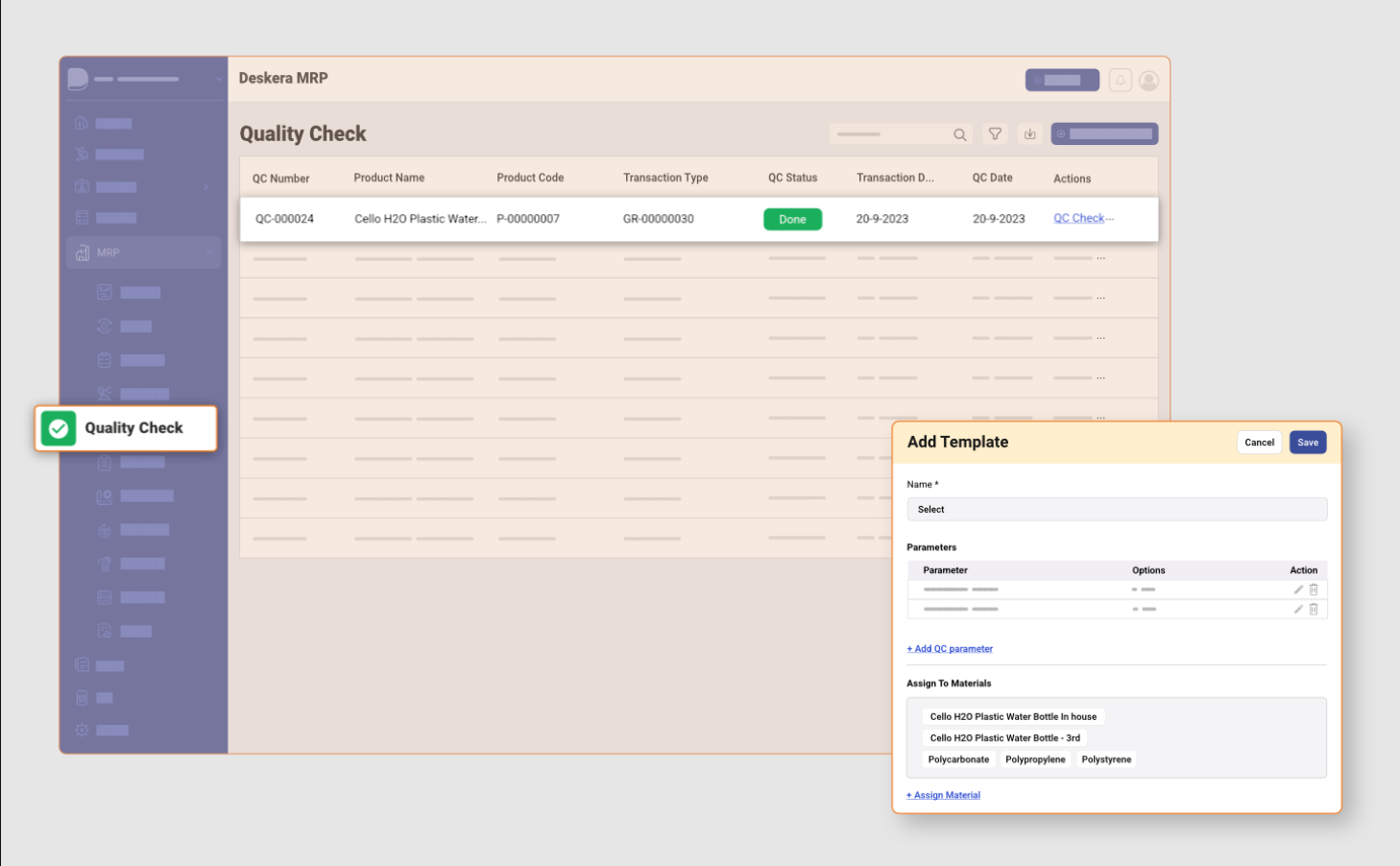
- Supply Chain Visibility: Deskera provides end-to-end supply chain visibility, allowing businesses to track the movement of goods, monitor supplier performance, and identify potential bottlenecks in real time. This visibility enables better inventory management, reduced lead times, and improved collaboration with suppliers.
- Customer Insights: Deskera helps businesses gain real-time insights into customer behavior, preferences, and purchasing patterns. By analyzing customer data in real time, businesses can personalize marketing campaigns, tailor product offerings, and enhance customer satisfaction and loyalty.
- Integration Capabilities: Deskera integrates seamlessly with other systems and applications, including manufacturing software, MRP software, and third-party analytics tools. This integration ensures that businesses have access to real-time data from multiple sources, enabling comprehensive analysis and informed decision-making.
Key Takeaways
The integration of real-time Analytics into Food and Beverage ERP systems represents a paradigm shift in the way companies operate in this industry. By harnessing the power of real-time data insights, businesses can unlock new levels of efficiency, agility, and innovation.
The 14 ways in which real-time analytics in food and beverage ERP elevate business performance are:
- Demand Forecasting: Real-time data on sales, inventory levels, and customer preferences enable more accurate demand forecasting. This helps in optimizing inventory levels, reducing stockouts, and minimizing excess inventory costs.
- Inventory Management: Real-time analytics in food and beverage ERP provide insights into inventory turnover rates, shelf-life management, and stock movement patterns. This allows businesses to streamline procurement, minimize wastage, and ensure product availability.
- Production Planning and Optimization: By analyzing real-time data on sales trends, production capacities, and resource availability, food and beverage companies can optimize production schedules, minimize idle time, and improve overall efficiency.
- Quality Control: Real-time analytics in manufacturing software can monitor various parameters such as temperature, humidity, and pH levels during food processing and storage. Any deviations from predefined thresholds can trigger immediate alerts, enabling proactive quality control measures and reducing the risk of product recalls.
- Supply Chain Visibility: Real-time analytics in MRP software provide visibility into the entire supply chain, from raw material sourcing to distribution. This helps in identifying bottlenecks, tracking shipments, and mitigating risks such as delays or disruptions.
- Price Optimization: By analyzing real-time market data, competitor pricing strategies, and customer behavior, food and beverage companies can dynamically adjust pricing to maximize profitability while remaining competitive.
- Compliance and Regulatory Reporting: Real-time analytics in manufacturing ERP facilitate continuous monitoring of regulatory compliance requirements, such as food safety standards and labeling regulations. This ensures timely adherence to standards and reduces the risk of non-compliance penalties.
- Customer Insights and Personalization: Real-time analytics in food and beverage ERP help in understanding customer preferences, purchasing patterns, and feedback. This enables personalized marketing campaigns, product recommendations, and loyalty programs, leading to enhanced customer satisfaction and retention.
- Operational Efficiency: Real-time monitoring of key performance indicators (KPIs) such as equipment utilization, labor productivity, and energy consumption allows businesses to identify opportunities for operational improvements and cost savings.
- Decision-Making: Real-time access to accurate and relevant data empowers management to make informed decisions quickly. Whether it's adjusting production schedules, reallocating resources, or launching new products, real-time analytics provide the insights needed to stay agile and competitive in the dynamic food and beverage industry.
- Continuous Improvement: Real-time analytics in food and beverage ERP systems drive continuous improvement by enabling real-time monitoring of performance metrics, data-driven decision-making, and process optimization. Empowering employees to contribute to improvement initiatives fosters a culture of innovation and accountability, leading to sustained growth and competitive advantage in the industry.
- Predictive Maintenance: Real-time analytics in food and beverage ERP can predict equipment failures and maintenance needs based on historical performance data and real-time sensor readings. By proactively addressing maintenance issues before they occur, businesses can minimize downtime, reduce maintenance costs, and optimize equipment lifespan.
- Sustainability Monitoring: Real-time analytics in manufacturing ERP enable businesses to monitor and analyze environmental metrics such as energy consumption, water usage, and waste generation in real time. This helps in identifying opportunities for sustainable practices, reducing environmental impact, and meeting sustainability goals.
- Supplier Performance Management: Real-time analytics in MRP software provide insights into supplier performance metrics such as delivery times, product quality, and compliance with contractual terms. This enables businesses to evaluate and optimize supplier relationships, negotiate better terms, and ensure a reliable supply chain.
Thus, real-time analytics in food and beverage ERP systems enable companies to optimize their operations, improve customer satisfaction, and drive sustainable growth in today's fast-paced business environment.
Real-time analytics elevate business performance across all facets of food and beverage manufacturing. Embracing this technology is not just a competitive advantage—it's a strategic imperative for success in today's fast-paced and ever-evolving market landscape.
Overall, Deskera empowers food and beverage businesses with the tools they need to harness the power of real-time analytics, optimize operations, and drive business success in today's competitive market landscape.
Related Articles

